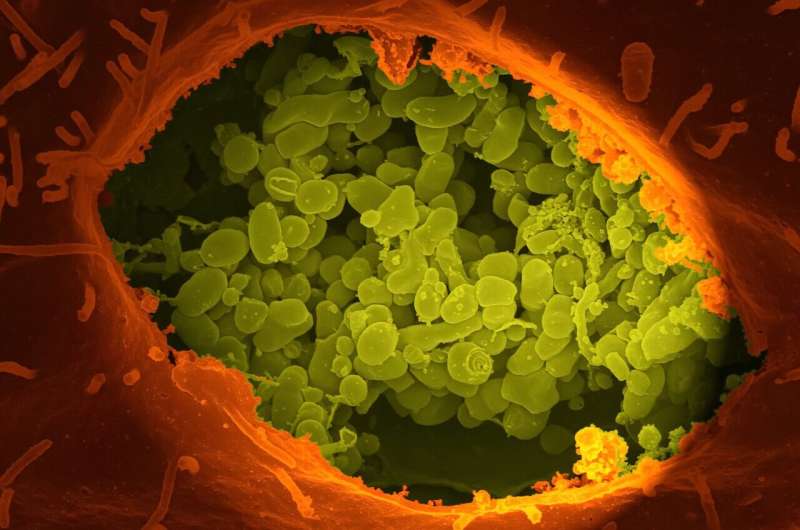This article has been reviewed according to Science X's editorial process and policies. Editors have highlighted the following attributes while ensuring the content's credibility:
fact-checked
peer-reviewed publication
trusted source
proofread
Gut bacteria key to fighting colorectal cancer, study suggests

Metabolites produced by gut bacteria during digestion can be used to trigger an immune response against colorectal cancer cells, according to new University of Alberta research, published in Frontiers in Immunology, that points toward a potential treatment for one of the deadliest forms of cancer.
The research team found that the metabolites activate a molecule on the surface of the cancer cells that attracts immune cells, called T cells. The metabolites are also able to enter the nucleus of the cancer cells and alter their DNA, which further attracts the attention of the immune system.
"What we saw is that these products regulate a key molecule on the tumor cells that T cells directly interact with, so it provides a way for the T cells to detect that the tumor cell is there, that there's something wrong and that they want to eliminate it," explains Kristi Baker, associate professor in the departments of oncology and medical microbiology and immunology.
"The products were also making changes in the cell's gene expression, which coordinates interactions between the cancer cells and the immune system," says Baker.
Colorectal cancer is the second most lethal cancer for men and third for women, according to the Canadian Cancer Society, which estimates 9,400 Canadians died from it in 2022.
Baker's trainee Courtney Mowat led the research and carried it out with the help of three undergraduate students.
"We hear a lot that a diet high in fiber is very beneficial and potentially protective against cancer, so part of the question we were asking was how fiber could be contributing to cancer protection," explains Baker.
The team tested two of the most abundant metabolites produced by gut bacteria as they digest dietary fiber—butyrate and propionate. The researchers exposed cancer cells in the colons of mice to the metabolites to observe their lasting effects. They also tested the metabolites on human cancer cells in the lab to confirm the results.
"I was really surprised by the fact that the response was so strong and that it was so reproducible," Baker notes.
Baker plans to continue her research to better understand the mechanisms involved in the response, in hopes of one day seeing the research used to develop prognostic tests or new cancer treatments. She will test the metabolites in different concentrations and combine them with immunotherapies to see how effective they are against different types of cancer cells.
"For example, if we find a patient who doesn't have a lot of the bacteria that naturally produce these particular metabolites, maybe they could take a pill that would basically turn on those same pathways in order to boost the immune response," she explains, noting that simply eating more dietary fiber would likely not produce enough of the target metabolites.
More information: Courtney Mowat et al, Short chain fatty acids prime colorectal cancer cells to activate antitumor immunity, Frontiers in Immunology (2023). DOI: 10.3389/fimmu.2023.1190810



















